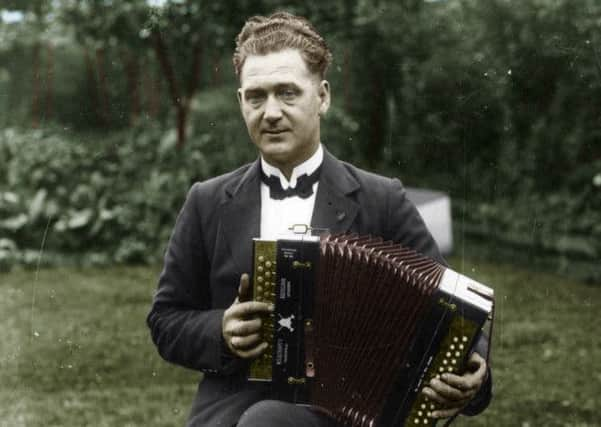William Hannah getting the recognition he deserves


A Wilkinson Excelsior... it could be a razor, or even a motorcycle; particularly the latter when you learn that it was owned by a Scottish dance band leader, a breed partial to motorbikes. But as the cognoscenti will know, the Wilkinson Excelsior was a melodeon, this model dating from around 1927, and it was the signature instrument of William Hannah, a sadly neglected virtuoso who was a precursor of Jimmy Shand and Will Starr. Now, the painstaking transcription of his 78rpm and wax cylinder recordings and the restoration of his favoured instrument should see Hannah’s contribution to Scottish music more widely appreciated, thanks to the efforts of accordionist Luke Daniels, whose album Tribute to William Hannah has just been released on the Greentrax label. The irresistible zest of its country dance sets, played by Daniels, fiddler Neil Ewart, pianist John Paul Gandy and guitarist Ian Carr, belies the demanding task of recreating Hannah’s music through transcription.
“It’s a bit different from my usual style,” says the Oxfordshire-raised, Hamilton-based Daniels, more known for his Irish-style box playing and contemporary composition. “Digging around” for wax cylinder recordings to transcribe, he initially homed in on the Wyper brothers, Daniel and Peter, who made the earliest wax cylinder recordings of Scottish melodeon music. “They were based in Hamilton, where I live, and some of the older members of the Salvation Army church where we go remembered the family, because they had a music shop there.”
Advertisement
Hide AdDaniels, 43, also unearthed that old Wilkinson box lying in someone’s loft, which he had restored by accordion repairer Theo Gibb. “There wasn’t enough substance for a recording of the Wypers’ tunes. It was only when I discovered Hannah, a genuine celebrity from the 1920s, that we had sufficient musical meat to transcribe it for a good 45 minutes’ worth of music. His fantastic arrangements were a total bonus.”
Hannah was born in 1891 in Blackburn, West Lothian, where, like so many Scottish mining communities, the melodeon, later eclipsed by the piano accordion, was commonplace. He served with the Argyll and Sutherland Highlanders in the First World War, and was a Home Guard Lieutenant in the Second, during which time he coolly disposed of a live grenade, saving the lives of several people. He was later injured by a bomb and was awarded the MBE in 1944. Peacetime saw him working as head postman at Bathgate Post Office, playing with his band for dances and concerts and recording for Parlophone and Columbia. His music was cited by Jimmy Shand as a major influence, while his instrument of choice, that Wilkinson Excelsior, played a part in the evolution of the famous Shand Morino.
On at least one occasion, Hannah, who died in 1961, drove to London on his motorcycle, melodeon strapped to his back, to record for Parlophone, an exploit reminiscent of Shand, who also favoured fast motorcycles.
Daniels hopes the new album will revive Hannah’s reputation: “He was a real master of Scottish music and he made great strides in the design of the instrument.”
Daniels and his colleagues birl out Hannah’s characterful arrangements of reels, jigs, Scottisches and waltzes with light-fingered gusto. It introduced him, he says, to a whole new dance scene that was beyond his usual sphere of activity. “I couldn’t have done it without the help of people like dance band leader Ian Cruickshank and Charlie Todd [archivist of Peebles Box and Fiddle Club].”
Getting to grips with the restored melodeon was something akin to driving a vintage car. “It’s surprisingly responsive as an instrument, but you really had to dig in,” he says, adding that he found playing it for the recording for some 36 hours over four days physically draining.
Advertisement
Hide AdHe’d like to play the restored material for dancing and plans gigs for the end of May, including in the “traditional music academy” his charity Gael Music has established at the Museum of Rural Life in East Kilbride.
Not everyone, it seems, approved of this labour of love. Daniels recalls that when he first contacted one collector about transcribing from his wax cylinders of the Wyper brothers, the response was derisive. Fortunately, Daniels and company persevered, creating a rare tribute to a forgotten musician.
• For samples of original recordings alongside the reconstructions, see www.gael.org.uk/tributewillhannah.html